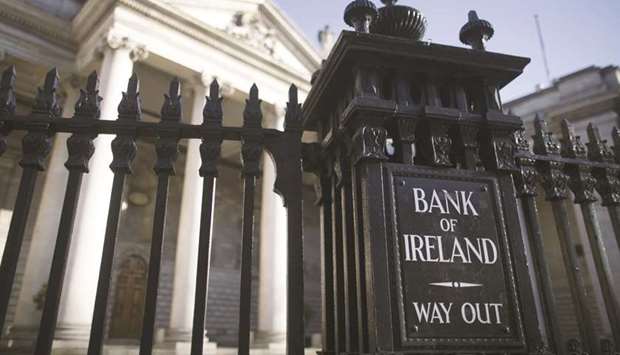Bank of Ireland Group Plc is offering Europe’s highest-paying bank CoCo bond in several months, joining a clutch of deals from junk-rated firms testing investor appetite for risk following the coronavirus turmoil.
The lender will sell 625mn euros ($675mn) of notes paying 7.5% interest, the most on an offering of euro-denominated Additional Tier 1 notes since October, according to data compiled by Bloomberg. AT1s are used to raise money for a bank’s cash safety cushion and stand first in line for losses.
A trio of sub-investment grade company bond deals are also on offer in Europe on Thursday as the market for global corporate junk bonds stages a revival, with more than $13 billion of deals in the US this week alone.
The return of riskier debt offerings follows a slump in sales of the securities through much of March and April as the Covid-19 pandemic roiled global markets. Bank of Ireland’s deal would be the first benchmark-sized sale of the subordinated bank notes since February, when ING Groep NV had to boost the value of its coupon to placate investors after its chief executive officer resigned.
“I wouldn’t say the high-yield market is open to all, rather it’s a case of dipping the toe in for better-rated names that want to beef up liquidity,” said Mark Benbow, a fund manager who helps oversee around $1.5bn across high-yield strategies at Kames Capital. “This crisis is almost a liquidity crisis.”
Even as warnings of a prolonged economic downturn ring loud, the risk of holding lower-rated debt has eased after spiking to the highest since 2012 during March. CoCo bond yields have roughly halved to about 7.8% since the peak of the sell-off in March, according to a mixed-currency Bloomberg Barclays index. The notes are particularly risky as they can be written off or converted in to equity if a lender’s capital levels fall too low.
Europe: Primary sales have slowed on Thursday as measures of credit risk nudge higher and stocks fall, led by declines in travel and auto shares. Just two high-grade deals are being marketed, including a 1 billion-euro note from Germany’s state of Schleswig-Holstein.
Virgin Money UK Plc may revive bond sales in the months ahead as coronavirus turmoil fails to win most European lenders extra time for building loss-absorbing buffers.The region’s high-grade company bond market is split four ways according to investors’ assessments of the likely long-term impact of the coronavirus, CreditSights wrote in research published on Thursday. Tech and energy firms are among sectors with limited second-quarter losses expected, while hotels, restaurants and metals and mining are the “most troubling”.
Companies are beginning, albeit slowly and some unsuccessfully, to repay the deluge of loans raised over the past two months to shore up liquidity amid the coronavirus pandemic that has hit earnings and revenues globally.
Asia: Chinese property developer Zhenro Properties Group Ltd is marketing the region’s first junk dollar bond for weeks, tempting investors with a yield of about 8.9%. Debt buyers in Asia have so far favoured stronger credits, given concerns about the long-lasting impact of the crisis on economies and corporate defaults.
Yield premiums for investment-grade Asian dollar notes widened about 3 basis points on Thursday, according to a trader.
New Zealand’s government announced a massive fiscal stimulus package in its annual budget that will see debt levels surge but could help the economy return to growth as soon as next year.
US: Attention will turn to the latest American jobless data after another steep sell-off on Wall Street.
Sales of US high-yield bonds are booming, with weekly volume topping $13bn as Uber to Royal Caribbean Cruises Ltd bring deals. In the investment-grade space, UnitedHealth Group Inc raised $5bn across five notes on Wednesday.

A sign at the Bank of Ireland directing traffic reads ‘Way Out’ and is seen on the railings outside an entrance to the bank on Dame Street in Dublin. Bank of Ireland is offering Europe’s highest-paying bank CoCo bond in several months, joining a clutch of deals from junk-rated firms testing investor appetite for risk following the coronavirus turmoil.
